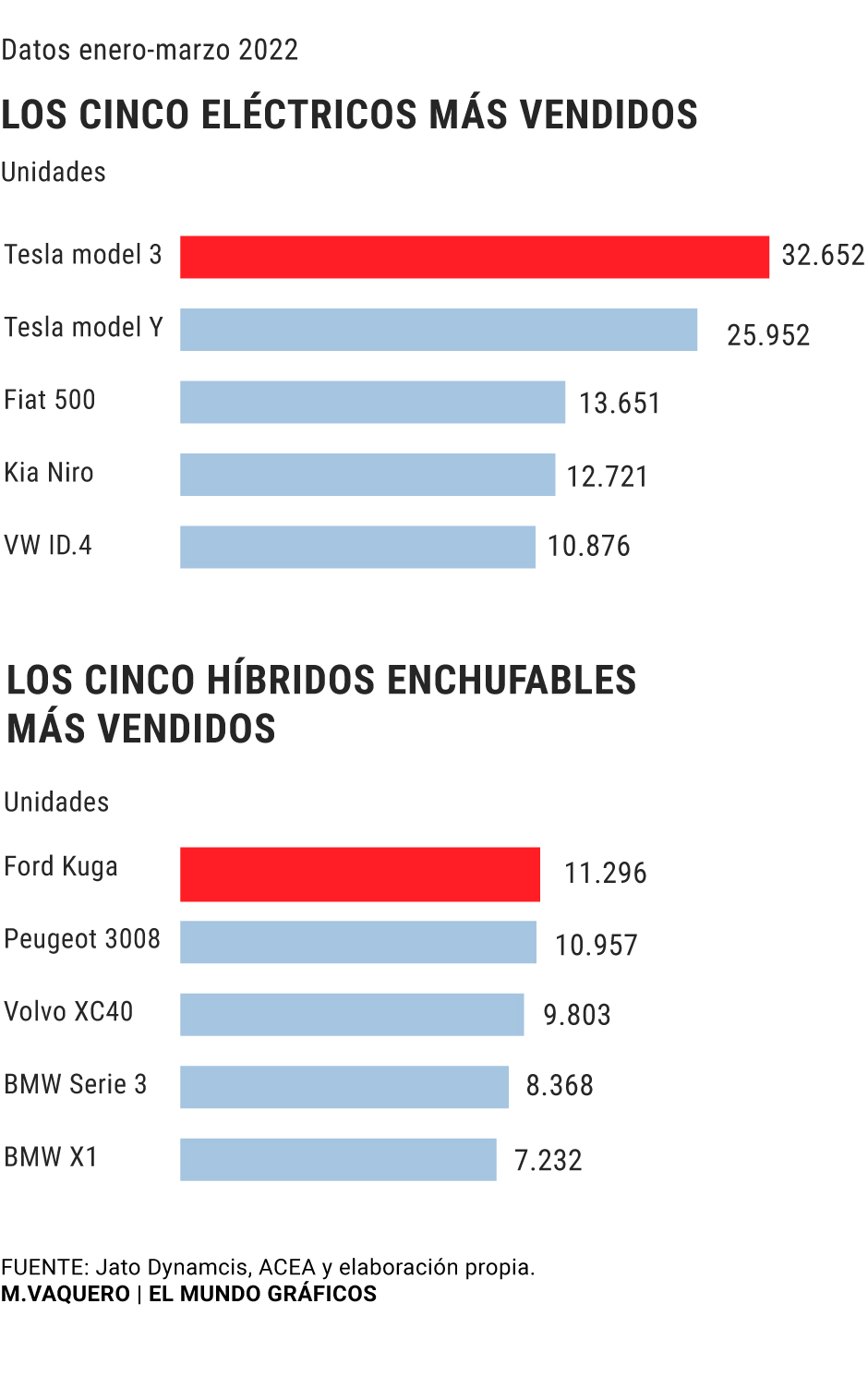Official fleet Neither Pedro Sánchez nor any of his ministers travel by electric car
NOx The ITV will not measure carcinogenic gases until 2025
Repsol Brufau "Let it be the citizen and not the politician who decides whether to buy an electric"
Plug-in hybrid cars (or PHEVs in jargon) are the logical transition to decarbonisation, part of the European industry insists
.
And it is that their combustion engine allows them to avoid the inconveniences of a recharging network that is still scarce since their real autonomy does not depend on a plug, traditional gas stations also serve them.
The figures from Acea, the manufacturers' association, dismantle the argument and/or desire.
Which means that Spanish factories should take note since
manufacturers such as Renault have made it clear that their Spanish production will focus on these models in the coming years.
More than three extra quota points
In the first three months of 2022, 325,285 battery-powered cars have been sold in the EU, with a
share of 10%
and a growth rate of 53%
;
and 236,991 PHEV vehicles, with a share of 8.9%
(down 6.1%).
Not only that:
if the entire Old Continent is considered,
including markets as inclined as Norway or the United Kingdom, the differential grows:
11.8% share compared to 8.6%.
More data, now from the consulting firm Jato Dynamics.
In March, the best-selling model in the region was the electric Tesla Model 3,
followed by the Peugeot 208 (also with battery-powered versions) and the Tesla Model Y, third.
Less waiting time
"The arrival of
more and more models, the greater aid and incentives for purchase and use favor them
over plug-in hybrids, more technologically complex [they have dual propulsion] and therefore also costly to acquire," says Jato
.
It should be added the brutal increase in fuel prices and the shorter waiting time,
since manufacturers, with limited production due to chips and the war in Ukraine, are interested in selling their battery-powered models.
If only for its contribution to the reduction of CO2 emissions.
In this sense, Arval -the BNP Paribas leasing company- revealed that,
in 2021, the term to receive an electric was reduced by 20%;
but it went up in the same proportion for a plug-in hybrid.
And 40% in a gasoline or a diesel.
Although photography by country is not homogeneous.
The large volumes correspond to Germany, the United Kingdom or France.
But it is that, in Norway, eight out of 10 cars sold since January, were battery.
In Sweden, almost three out of 10
to go down to 4.4% share in Spain or 3.3% in Italy.
Spain, at the tail of Europe
The latter has a lot to do with the recharge network.
Especially, the public one, since in Spain it is estimated that up to
70% of cars sleep on the street,
without their own plug to connect to.
Well, the latest
Anfac Electromobility Barometer
reveals that we are still at the bottom of Europe: taking into account the sales of electric vehicles with respect to the total;
and recharging posts in relation to the motorized population,
Spain achieved a score of 27.5 points out of 100, when the European average was 61.2.
The case of the network is bloody, since
if 2021 should have ended with 28,240 public posts, it did so with 13,411.
And 88%, of 22 kWh or less.
That is to say, of slow charge that eternalizes the recharge.
Here, the PHEVs rule
This, together with the fact that
the electric ones are still more expensive for a Spaniard than for our richest neighbors;
Since PHEVs enjoy the same ZERO label,
it means that more than battery-powered models have been sold in Spain (10,451 for 7,253) in 2022.
And so, President Sánchez's call sounds almost laughable at the presentation of the VW Group's battery gigafactory in Sagunto last week: "we all have to buy electric," he said.
The story could be applied starting with the fleet of official Government cars.
The answer came the next day, even if it was from an interested party.
Antonio Brufau, president of Repsol, reminded him that it should be the citizen and not a politician who decides if he wants to buy an electric car.
Likewise, he regretted that the potential of ecological fuels is not allowed to be exploited.
Elon Musk, in the delivery of the first cars manufactured in Berlin
Tesla, above historical brands
In the evolution of the battery-powered car market in 2022 in Europe, the North American manufacturer Tesla has a lot to do with it.
Thus, in the month of
March, apart from placing two of its models in first and third position
, the company chaired by Elon Musk,
registered almost 42,000 units
that month,
surpassing Skoda, Seat, Nissan, Dacia or all brands of Stellantis,
with the exception of Peugeot.
This effect
is diluted in the results of the quarter, where it falls to eighteenth position, although it is placed in the Top Ten in nine markets.
Likewise, the Model 3 is surpassed by another 15 cars in a calculation led by the
Peugeot 208 (51,890 units) followed by the Dacia Sandero (47,491) and the VW Golf (46,323 cars).
Tesla, by the way, has an important growth factor: its Berlin factory, which already delivered its first vehicles at the end of March.
Conforms to The Trust Project criteria
Know more
Traffic

